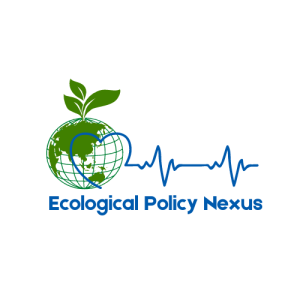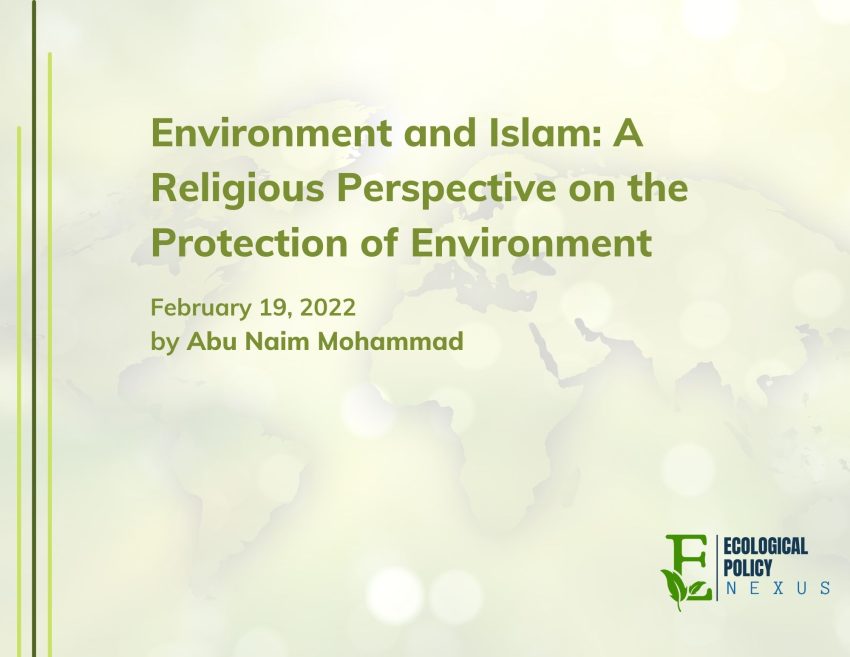Review Article
Written by Abu Naim Mohammad
Although the environment is a very short and common word, it has a wide meaning. Just as every element of the environment (the term environment, it comprises air, water, and land[i]) is important for the survival of mankind, if any one of them goes bad, the consequences are terrible for human society. We have already suffered irreparable damage as a result of our negligence and indiscriminate treatment of the environment. The Great Creator has made for us every object on earth to have its own trajectory. He pointed to this and said in the Holy Qur’an, the religious book of the Muslims, “each one revolves in its own way”[ii]But in the name of industrialization, urbanization, and modernization, we the humans are pushing the environment of the only habitable planet in the universe into the throes of an inevitable erosion. And that’s why all kinds of disasters are happening to us. Allah says, “Allah makes them taste the outcome of some of their deeds they have committed in order that they may desist”[iii]So what is our responsibility to this environment? What are the religious restrictions? In this article, I’ll try to shed some light on these topics.
What is Environment:
N. Manivaskam, a prominent Indian Environmentalist defines environment as,“Environment is the sum total of all conditions and influences that effects the development and life of organism”[iv]
He also bounded the environment in a specific boundary. He said, “To include air, water and land dynamically the interrelationship which exists between these and human beings other living creatures, plants, microorganisms and property.”[v]
The identity of the environment can be easily inferred from the above quotations. Furthermore, Islam considers land, water, fire, forest, and light as the basic elements of nature that belong to all the creations of Almighty consisting of human and non-human beings.
Now let’s focus on some of the aspects of Islam in protecting the environment from pollution.
Air: Pollution and Prevention in Islam:
“And Allah alone sends winds that raise and builds up clouds. Then I (Allah) drive it (The cloud) towards some dry and dead land to water it. Then with that, I give life to the earth after its death. Similar will be the process of the Rising (of the dead)”[vi] Just as we know the importance of air in human life and for regenerating all the organs of the world from this verse of The Qur’an, we also know the indescribable harm that air pollution causes to human health. That is why the Prophet Muhammed (peace be upon him) pointed out that for the warning of mankind, one and a half thousand years ago today, Muslims were taught how to seek refuge in Allah from air pollution.
In Sahih Muslim, it is narrated from Ayesha (one of the wives of the Prophet) that when the wind was blowing, the Holy Prophet (PBUH) would say: “O Allah, I want the good things of it from you. I want the good inside and I want the good of what you send by it.”[vii] And I seek refuge in you from its evil (pollution) and from the evil (diseases) that you send by this.
Even millions of years ago, after the creation of human beings, Allah has taught us the method of burying people through crows in order to save one of the means of air pollution from the decay of living beings. He says, “then Allah sent a crow that started scratching the earth to show him how to hide his brother’s corpse.”[viii] Not only burying the dead but also cigarettes that cause air pollution are unanimously rejected in Islam. Also, to prevent all airborne diseases, including the current epidemic Covid-19, medical Scientists are advising to cover the face during coughing, but the prophet (PBUH) taught us that many years ago. Narrated from Abu Hurairah (one of the companions of the Prophet), “When the Prophet (PBUH) sneezed, he would cover his face with a piece of cloth or his hand.”[ix]
In this way, everything that pollutes the air has been discouraged by Islam.
Water: Pollution and Prevention in Islam:
“And I (Allah) originated (the life of) living organisms (on earth) from water.”[x] From this verse of the Quran, it can be easily inferred that water is the source of all things which is scientifically proven as well as recognized by Islam. According to the Qur’an, water is the main source of sustenance.[xi] So keeping the importance of water in mind, similar importance has been given by Islam to keep it pure and pollution-free.
Narrated from Abu Huraira: The Prophet (PBUH) said: “None of you should urinate in stagnant water which does not flow.”[xii]It is clearly understood from the Hadith that urination cannot be done everywhere. So that the environment is not polluted. The lifestyle (Sunnah) of the Prophet Muhammed (PBUH) is also effective in keeping drinking water germ-free. He said that none of you should breathe in a container of water.[xiii] The above two hadiths prove how strong the call of Islam is to prevent water pollution.
Soil: Pollution and Prevention in Islam:
“And Allah has made the earth a vast expanse for you, so that you may move around through its broad ways.”[xiv]
One-fourth of the earth is soil. As the population grows and the sea level rises, so does the ratio of soil to humans. As the population grows, the soil loses its fertility as a result of industrialization and urbanization under the influence of waste products and various harmful chemicals.
But if we look at the situation 100-150 years ago, the soil of the earth was different. There was fertile land suitable for planting crops and trees. Allah himself has described it in the Qur’an, “So man should look at his food, indeed we split the earth and tear it asunder. We then grow from it grain, and grapes and vegetables and the olive palm and the date palm and thickly planted dense gardens, and (a variety of) fruits and (animals’) fodder.”[xv]We have done unplanned deforestation and turned the fertile soil of this planet into a barren rock. But Islam instructs us to plant trees and forests and to cultivate uncultivated lands through someone else if we can’t so that the fertility is not destroyed.
Regarding the planting of trees, the Prophet Muhammed (PBUH) said: “If you know for sure that the Hour has come, then if you have a sapling of a tree in your hand that can be planted, then plant that sapling.”[xvi]Also, in Islam, when one plants a tree, the fruit of that tree, the air that is generated from the tree, and even the shade are considered donations, and the reward is given in that proportion. The prophet (PBUH) also said about cultivating land, “whoever has extra land (excluding accommodation) will either cultivate it himself or have sock done by one of his brothers.”[xvii]
In this way, Islam has direct and indirect direction in almost every issue related to the environment.
Sound pollution is being considered as another aspect of pollution. There are clear provisions in regard as well. Everything that pollutes the sound is considered disliked in Islam. For example, music too loud crying, and even guffaws (very loud laughter) is disliked in Islam.
Also, in a Hadith of the Prophet (PBUH), he mentions 7 ways of getting a free reward after the death of a Muslim, three of which are related to the protection of the environment. These three are digging canals, digging ponds, and planting fruit trees.
Finally concluding this article with a verse of the Qur’an, which we recite in our daily prayers. “Oh our Lord, grant us excellence in this world, and excellence in the Hereafter (as well).”[xviii] The excellence in this world is not possible when the environment is endangered, so we have to develop ourselves as a real eco friendly in the light of Islam’s direction in the interest of creating a beautiful habitat suitable for us and future generations.
[i] N. Manivaskam, environmental pollution (New Delhi, National Book Trust,1919), p-1
[ii] Al Qur’an, Surah Ya-Seen, V-40
[iii] Al Qur’an, Surah Room, V-41
[iv] Gopeshnath Khanna, Global Environmental Crisis and Management (New Delhi: Ashish Publishing House,1993), p-12
[v] Gopeshnath Khanna, The Environment Protection Act-1986 (EPA), Section-2, IBID, p-12
[vi] Al Qur’an, Surah Fatir, v-9
[vii] As Sayyid Sabiq, Fikhus Sunnah (Darul Fikr Publications, Beirut, Lebanon-1983), Volume-1, p-510
[viii] Al Qur’an, Surah Al Maidah, v-31
[ix] Hafiz Abu Shaikh Ispahani, Akhlakun Nabi (PBUH)-Islamic Foundation Bangladesh, p-331
[x] Al Qur’an, Surah Al Anbia, v-30
[xi] Al Qur’an, Surah Al Jathiyah, v-5
[xii] Abdullah Ibn Abdir Rahman Ibn Salih Al Bassam, Taiseerul Allam Sharhe Umdatil Ahkam, Volume-1, p-19
[xiii] Aforementioned, p-19
[xiv] Al Qur’an, Surah An Nuh, V-19&20
[xv] Al Qur’an, Surah Abasa, v-24-32
[xvi] Sahih Bukhari, Sunan Abu Daud.
[xvii] Sunan Ibn Mazah (Kutubkhana Rashidiah Deoband, India), volume-2, p-179
[xviii] Al Qur’an, Surah Al Bakarah, v-201.


Masah allah ❤️
Congratulations Bondhu Nayem
Good job man. Best wishes..
Great writing. Best wishes for Abu naim md Hossain.